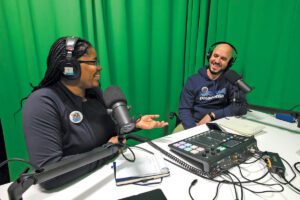Gorski works on the Ann Arbor District Library’s outreach team and hosts The Gayest Generation, an AADL podcast where he talks with older LGBTQ+ people. He says it aims to capture “the hardships and the joy of the LGBTQ community.”

Filmmakers Aliyah Mitchell and Juan D. Freitez at Fifth Avenue Studios. They originally planned to make a documentary on linguistics, but found so much material that they decided to extend it into a podcast. We Are What We Speak joined the Ann Arbor District Library’s growing portfolio in November. | Photo: Mark Bialek
In an early episode, Bob Enszer and Rick Farrand remembered what it was like to grow up “closeted,” repressing or concealing their sexual identities. Enszer was married to a woman for forty-five years before coming out in 2004. In another, author Curtis Chin described hiding his sexuality because it was “safer.” He participated in extreme right-wing politics throughout much of high school and college before coming out as an adult.
As a result, says Gorski, “the bridge between younger and older LGBTQ members is nonexistent or broken … That’s why this podcast is important. It’s also a matter of recording history.”
AADL communications and marketing manager Rich Retyi says the library launched Fifth Avenue Studios in 2022 as an extension of Fifth Avenue Press, which helps local writers publish their work. The studios host a bevy of podcasts to “find the stories we want to tell and the content we want to get out there. We want to entertain and inform people.” Like the press, the studios use an internal editorial team to review submissions.
The library’s podcast catalog dates back to 2009, when staffers began recording interviews in a studio at the downtown library. Fifth Avenue Studios opened it up to the community. In addition to quality studio time, they provide consulting and other support services.
“One of my passions is finding those stories that would have otherwise gone forgotten or unheard of,” says The Gayest Generation’s Gorski. “Our resilience and ability to be joyful in the face of adversity always shines through.”
We Are What We Speak, which debuted in November, looks at how language and linguistics connect the human experience. Host Aliyah Mitchell says she and her cocreator, Juan D. Freitez, originally planned to make a documentary on linguistics—but found so much material that they decided to extend it into a podcast. She talks with people with multicultural experiences about how language impacted their upbringing and adulthood.
“I want there to be a moment in the future where people look back and ask what were people’s experiences around language,” Mitchell says. “Because language is so ubiquitous, you can often overlook how it impacts how you see the world and connect with people.”
In one episode, filmmaker Tamara West describes growing up around a primarily oral language, Jamaican patois, being forced to speak colonial English at a young age, and learning to code-switch growing up. In another, Japanese filmmaker and photographer Toko Shiiki shares her experiences of growing up in a primarily Japanese-speaking household, using visual tools to compensate for her limited English vocabulary.
“I want people to see themselves documented in this big tapestry of language in which we exist and contribute,” says Mitchell, “I want people to be able to look back and pull from stories and inform themselves about what was going on, what were people thinking, and what were people experiencing.”
Retyi says the response to the podcasts has been overwhelmingly positive, both in person and online. “Part of what the library tries to do is bring interesting, useful, and cool things to our patrons and make things happen that might not otherwise happen,” he says.
“We’re recording these stories and interviews to capture them forever. We know the library is not going anywhere.”
ok not accurate. tamara doesnt make movies.
Thanks for catching this! The AADl website calls her a “higher education professional.” This article in the University Record goes into much more detail.